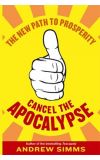
04 Mar 2013 03:22:37
Perhaps this is down to the incremental, drily pragmatic nature of democratic politics; perhaps it's just reflective of capitalism being capitalism, so that anything hostile to its interests is quickly neutralised. Whichever it is, while inequality is widening, glaciers are still melting and what passes for British debate about it seems laughable. On a bad day, it can seem as if the entirety of politics now rotates around a quarterly event: the release of the provisional figure for economic growth, or the lack of it.
The economist, campaigner and author Andrew Simms works in a rather different universe, accessible via the offices of the New Economics Foundation. He is most renowned for Tescopoly, his book about the rise of the titular retail giant, and his subsequent invention of the concept of "clone towns". But Cancel the Apocalypse is much more ambitious: a treatise on why the human race cannot go on as it is, and what we might be able to do by way of an alternative. In addressing what the political-economic vernacular calls sustainability, it takes in the banking system, energy generation, the global air-travel business, meat-eating and more – along with such tangential reference points as the psychedelic rock band Hawkwind, Kurt Vonnegut's Galapagos and Doris Lessing's The Memoirs of a Survivor. It is a breathless, quotation-packed work, light years from anything to do with orthodox politics, which suggests someone unpacking the entire contents of their head: it's probably about 100 pages too long, and best read at the rate of a chapter every few days.
Yet Simms's talent for casting gigantic issues in pleasingly human terms is clear, and proved by his evocation of the five or so days in 2010 when the ash from an Icelandic volcano shut down European airspace. He describes staring into the unblemished blue from Kew Gardens, and realising what was afoot: "Flying was something we thought we couldn't live without, [but] the world did not come to a standstill." He is also keen to push his arguments into new territories, as evidenced by what turns out to be the book's unexpected highlight: a chapter on advertising and PR, and the extent to which they work as the free market's multicoloured telescreen. And he has facts galore. The county of Cornwall alone, he says, has to dispose of 4,000 tonnes of junk mail every year – "500 dustcarts' worth, costing them around £700,000". If you consider left-field the idea of slowing down the capitalist machine via a ban on billboard advertising, it's worth bearing in mind that it has already been done in Vermont, Maine, Hawaii and Alaska.
No one will agree with every word. For my own part, I was maddened by Simms's complete hostility to nuclear power. A lot of what he writes is open to an obvious enough criticism: that his arguments should probably be addressed at China, India and Brazil rather than a small and increasingly insignificant corner of northern Europe. But there is a joy in reading someone setting out the case for such unmentionables as a 21-hour working week and an economy that runs wholly on renewables. Moreover, when you have set the book down and pondered its essential message, you are left with an entire mindset rather than specific proposals.
Consume less, he says. Be sceptical about new technology. Slow down. And do not fall for the modern political class's post-Blair belief that history is bunk, and to draw on the past is to be a hopeless throwback: it is only a comparative blink since the second world war found millions of people reshaping their lives in the cause of a common endeavour, and the same thing could yet happen again.
And then there is the fetish of growth, or rather growth-ism. As Simms points out, the idea that economies necessarily have their limits was being voiced when capitalism was still young: in 1848, John Stuart Mill argued that "a stationary condition of capital and population implies no stationary state of human improvement". A century and a half later, Adair Turner, a former director of the CBI, told Simms that if anyone thinks "the most important objective of public policy is to get growth from 1.9 per cent to 2 per cent and even better 2.1 per cent", they're worshipping a "false god", and "extra growth does not automatically translate into extra human welfare and happiness".

